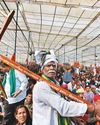
Supreme Court’s seven-judge constitution bench ruling on subclassification of Scheduled Tribe (ST) and Scheduled Caste (SC) categories required an exhaustive study and a report by a commission. In fact, many from the SC and ST communities felt the ruling itself should have been preceded by a database for the ready reference of the SC.
The message of the SC judgment is two-fold. First, the country should go beyond the parametres of the Constitution to ensure justice to the genuinely deprived. However, the creation of the concept of creamy layer or sub-categorisation of SCs and STs is not allowed by the Constitution. And second, the SC needs to know which sections are truly deprived. “Such a ruling of the constitution bench of the SC should have been accompanied by a proper database on the economic and social situation of the SC-ST communities. And for this, the government should have constituted a commission to study their situation and come up with an exhaustive report first,” opined Prabhakar Tirkey, the director of Jharkhand-based Centre for Tribal Studies. Jharkhand is known for its independent tribal opinions on socio-political and economic issues and has a long history of tribals fighting for their rights to political self-determination.
During the tenure of Prime Minister Manmohan Singh, the Ministry of Tribal Affairs had prepared a draft for National Tribal Policy, which never progressed beyond. Tribal groups from across the country have been urging the present government to prepare and promulgate such a policy but no thought has been given to this serious demand yet at the government level.
Bu hikaye Outlook dergisinin September 21, 2024 sayısından alınmıştır.
Start your 7-day Magzter GOLD free trial to access thousands of curated premium stories, and 9,000+ magazines and newspapers.
Already a subscriber ? Giriş Yap
Bu hikaye Outlook dergisinin September 21, 2024 sayısından alınmıştır.
Start your 7-day Magzter GOLD free trial to access thousands of curated premium stories, and 9,000+ magazines and newspapers.
Already a subscriber? Giriş Yap

Protest 2.0
Farmers still have hopes from their leaders, but time is running out. The enemies, in the meanwhile, are sharpening their weapons

Time for Course Correction
What the protest by Punjab's landed peasantry tells us about the state's economy and society

The Farmer-Composing Antagonist
Farmer leader Jagjit Singh Dallewal has been on a fast-unto-death at Khanauri border to pressurise the government to fulfil its promises to the farming community

Nomadland
All eyes are on President-elect Donald Trump and his policy on immigration

Far from Home
We have forgotten the plight of Afghans who fled to India, and continue to suffer

Bang Bang That Awful Sound
What happens when we listen closely to the soundscape of war?

Refugee Dilemma
For most Indian-origin Sri Lankan Tamils, who are victims of ethnic conflict and civil war, proving that they are not illegal migrants is a nearly impossible task

They Poured Fire on Us
The resilience of refugee women from Sudan, Ethiopia and Yemen in the face of war and displacement is remarkable

The Sound and the Fury
Iraqi poet, novelist, translator and scholar Sinan Antoon was born and raised in Baghdad.

The Day I Became a Woman
In a country where authorities have been directly engaging in the gruesome war against women for decades, artists like Nahid Hassanzadeh stand apart as a voice of dissent–a haunting reminder of the unwavering spirit of the rebellious Iranian women fighting against the Islamic Republic’s violent crackdown.